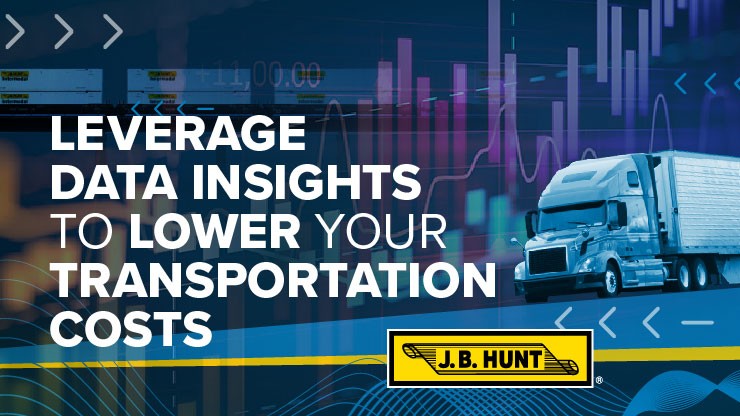Leverage Data Insights to Lower Your Transportation Costs

Article after article in every industry journal talks about the importance of data in marketing, sales, manufacturing, and more. But what about your transportation data? Data is paramount in the logistics business. But it’s not just about having data, it’s what you do with it that makes the difference. Data insights can help you see where you can gain efficiency in your supply chain, which carriers are performing well and which ones need to improve, as well as allowing you adjust when market conditions shift.
Metrics That Move the Needle: Understanding What You Can Control
You can break down shipping data into two overarching categories: freight characteristics and market conditions. Freight characteristics are those that you can control to an extent, while market conditions are usually events or trends that you react to or adapt with. Typical freight characteristics may include:
- Detention times—how long it takes to load or unload trailers
- Appointment times or pickup windows
- Multi-stop loads vs. drop and hook or single stop loads
- Lead time for pick-up appointments
- Shipment pricing
- Load details such as commodity, weight and special handling requirements
Every shipper has unique needs, so it’s important to understand how your freight characteristics impact your whole transportation ecosystem. Consistently reporting on metrics related to freight characteristics can help identify specific areas where you can improve both the rate carriers will charge to carry your load, as well as the service you can provide your own customers. Analyzing this data over time can help you to understand trends and help you to better prepare for the next expected market shift.
Supply Chain Solutions Providers: Your Ally in Data Collection and Analysis
Once you understand the overall impact that freight characteristics have on your supply chain efficiency, collecting and analyzing a mountain of data points may present its own challenge. Allocating personnel such as data scientists and analysts and technology resources to this effort may be cost-prohibitive or operationally impossible – at least in the short term. This is where an established relationship with a supply chain solutions provider can yield significant benefits. If your company does business with a provider that has heavily invested in technology and data analysis, this information may already be available to you. A conversation with your provider about their data collection and analysis capabilities can inform both short- and long-term decision making on transportation data management and strategy. Providers who offer these services are well-equipped to help you bring structure and understanding to your historic shipping data and make recommendations for improving your service, cost, and access to capacity. Depending on your company’s ability to intake this information, these findings can be covered during a monthly or quarterly business review or shared via a custom dashboard using data visualization tools if more frequent updates are preferred. The latter would provide the additional benefit of being able to check-in daily on the progress made towards efficiency and cost-saving goals once any operational recommendations are implemented. A provider with deep technological investments can also bring value through their analysis of other data sets. For example, if a provider has built and utilized digital freight matching technology in its own operations, they can likely provide you with additional data around carrier behaviors and preferences, historical and seasonal market rates and capacity utilization that can be applied inside of your business. This can be useful when you have a hunch about certain areas of your supply chain. The story revealed by your data can either confirm or relieve your feelings or point to necessary changes.
Creating Actionable Change Using Data Insights
Of course, the overall goal of data collection is to derive insights that can be used to create actionable change and produce greater efficiency in your supply chain. In order for this to happen, data must be consumed and analyzed continually—not just when market conditions are unfavorable. Aligning with a consultative, like-minded transportation provider empowers your business to make data-driven decisions about supply chain optimization and ultimately achieve valuable cost savings.
Ready to get real insights from your transportation data? Reach out to get started.

